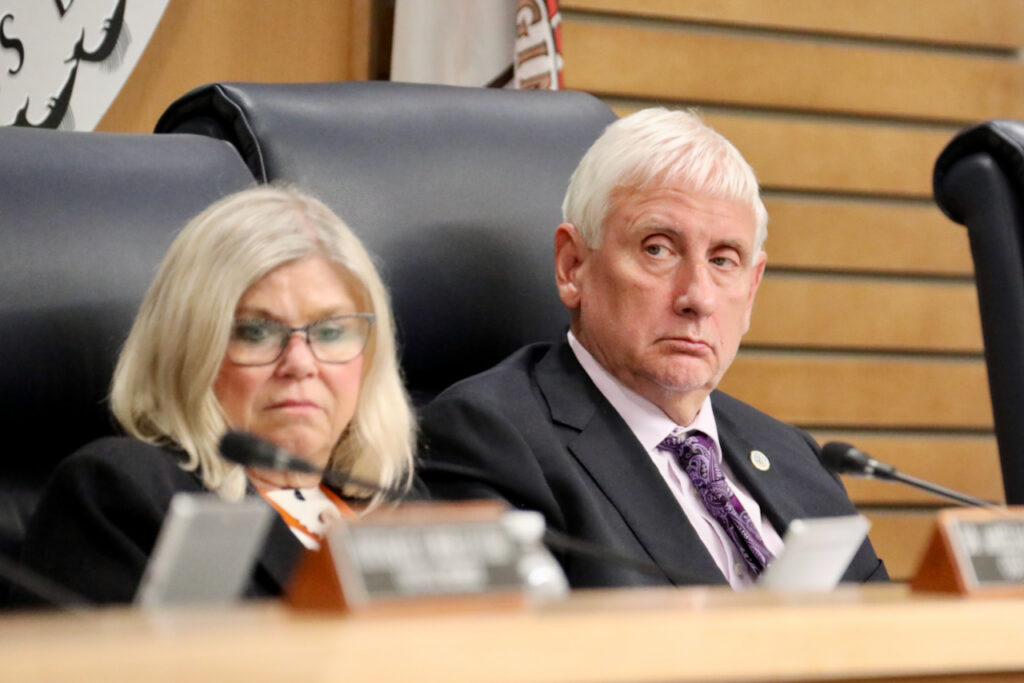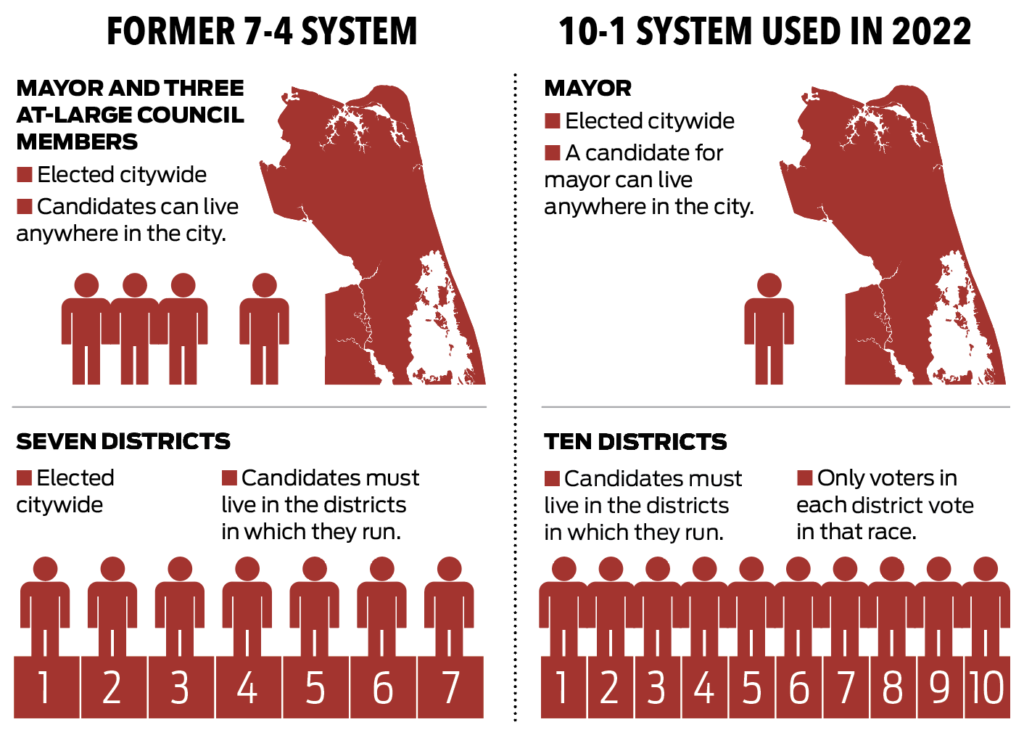
COURTHOUSE — A report summarizing a public engagement process to find preferences for a local voting system in Virginia Beach showed strong support for keeping a new 10-district system used this past year in the wake of a legal challenge in federal court and changes in state law.
The result of the review by the Weldon Cooper Center for Public Service at the University of Virginia shows clear support for the new system during engagement that had been sought by a majority of the City Council. Some citizens had warned the process might back a return to something similar to the old voting system found to be discriminatory by a federal judge — though elements of that system became irrelevant after changes to state law.
The city formerly had a controversial mix of citywide and district seats in which people living outside residency districts helped select representation for said district. Some proponents of the new system had warned a study could be used to undermine the new system, in which only district residents pick their City Council and School Board members, and which includes three minority opportunity districts meant to give minority voters a greater chance to elect candidates of their choice.
The consultants presented their findings to the City Council on Tuesday, June 20.
The conclusion?
Stick with the 10-1 system.
“There was a lot of support to retain the 10-1 system implemented in 2022,” said Charles Hartgrove, director of the Virginia Institute of Government at the Weldon Cooper Center. “It’s supported by a majority of residents who provided feedback, whether it be in one of our community input sessions or through the survey. It’s consistent with the research, and it’s also compliant under federal and state law.”
“As you can see, there is overwhelming support among these respondents for keeping the 10-1 system,” said Kara Fitzgibbon, director of the Weldon Cooper’s Center for Survey Research, at another point during the meeting.
“Eighty-one percent indicted some level of support,” she said, “and I’ll also note that, when comparing that support by different demographic characteristics, there were no statistically significant differences in support by race, by income, by district, by education.”
There was also more support than not for using a referendum to explore election systems, but she said the data suggests “there is more public support for this 10-1 system that was implemented in 2022 than we have, at this time, for pursuing other systems.”

Henley and City Councilmember Jennifer Rouse, who represents District 10, were council liaisons to the consultants.
“I’m just concerned that we didn’t get the participation from the public,” Henley said.
A moment later, Rouse commended city staff for their work.
“My recollection is that the function of the input sessions was to hear from the public their experiences with 10-1,” Rouse said.
“I see this survey and the summary as now educating the public on where we are, what the results of the study are for those who participated and also our legal options,” Rouse said.
City Councilmember Chris Taylor, who represents District 8, said the report by the Weldon Cooper Center was a wealth of information about voting in the city.
“We now see what we were hearing or what I was hearing, and there is an overwhelming support for 10-1 while, at the same time, people need more education,” Taylor said.
City Councilmember Joash Schulman, who represents District 9, said the city got what it asked for through the public engagement process.
“There’s no election system that is going to be perfect. Certainly, the one we had had flaws, and this one probably does, too. The one thing I pulled out of this report, and I kind of chuckled over it, was we found out that more people were familiar with our present system than our previous one.”
He added, “We asked the question, and I think we’ve got a pretty clear answer from the public.”
“The citizens spoke, and 81 percent say that they want to retain what we have,” said City Councilmember Sabrina Wooten, who represents District 7.
“What is our next step to solidify the conclusion and the results because we do need to move forward?” she asked.
Mayor Bobby Dyer said the City Council should consider that during a discussion, perhaps during its upcoming retreat.
“We took the pulse of the people,” Dyer said, acknowledging this has been a divisive topic. He said the council should digest the results and head into its retreat with more information that will support next steps.

In 2022, as the new system was set to be used, the federal decision was deemed moot on appeal due to changes in state law that meant the city’s former system could no longer be used because people living outside a district could vote for its representation. However, the appeals court returned the case to U.S. District Judge Raymond A. Jackson.
The plaintiffs and court could still act depending upon what Virginia Beach decides to seek as a permanent voting system.
The 10-district system was used last year because it could not be changed in time for the elections. At issue now, essentially, is whether Virginia Beach will act to retain the new 10-1 district system or consider something else that would meet federal and state law.
The old system does not do so, city officials have said, and it cannot return as it was.
In January, City Attorney Mark Stiles told the City Council that Virginia Beach effectively does not have a voting system on the books. The next local elections are in 2024, and the city must seek a charter change for a voting system. An advisory referendum about adopting a voting system could be held this year.
Holloway could not be reached for comment, but Allen on Thursday, June 22, said the survey shows citizens of Virginia Beach want to keep the system used last year in place going forward.
“I’m hoping the city will act according to the report they got back, but we’ll see,” she said.
“I think they need to go to Richmond, change the charter and implement fully the new election system,” Allen added. “They received back everything they asked for. They wanted public input. They go it. They wanted a consultant, and the summary came back that 81 percent of the voting public supports the 10-1 system.”

The numbers presented to the City Council were based upon responses to the mailed surveys, and the survey was distributed across districts and demographics. [Ed. — Descriptions of the methodology are available at this link. Previous news coverage of voting rights issues in the city is available at this link.]
Just 1 percent of respondents reported a negative election experience this past year, the first for the 10-1 system, and 7 percent reported said they were surprised by their ballots. There was slightly higher familiarity with the system used in 2022. About two thirds knew which of the newly used districts they lived within, whereas roughly a quarter didn’t know. The rest were unsure.
And 41.5 percent approved of the drawing of 10-1 district map, while 43.9 percent were neutral and 14.5 percent disapproved.
In comparing the 10-1 system and the former local voting system, 44 percent said the 10-1 system better represented their interests and 19 percent preferred the previous system, Fitzgibbon said. The rest said both represented their interests about the same.
The survey also discussed possibilities such as increasing the number of seats, with some support, or considering additions to a system such as ranked-choice voting, though some were unfamiliar with that. About 26 supported ranked-choice voting, 46 percent were opposed, and the rest were unsure.
“Those that were not at all familiar tended to oppose it,” Fitzgibbon said.
Overall, respondents opposed citywide selection of district representatives. When asked whether district reps should be selected citywide — a controversial aspect of the former system — Fitzgibbon said, “We had 30 percent support that, about double that opposed.”
Respondents were closer on whether to have some members of the council elected citywide, but only 29 percent supported all council members being elected citywide while 62 percent opposed it.
There was more support than not for using a referendum for exploring election systems. Fitzgibbon said the data suggests “that there is more public support for this 10-1 system that was implemented in 2022 than we have, at this time, for pursuing other systems.”
About 708 people attended community sessions, with some attending multiple meetings. Anecdotally, there was support for keeping the 10-1 system because people believe it improves representation, leads to responsiveness and makes seeking office accessible. A minority expressed concern about how the system effects the School Board, how districts were drawn and because voters select fewer representatives.
And a review of research suggests single-member districts are the better choice here, and the city might consider ranked choice voting, though that was not recommended for now, Weldon Cooper reported.
© 2023 Pungo Publishing Co., LLC


One thought on “Outreach results support sticking with 10-1 local voting system in Virginia Beach”